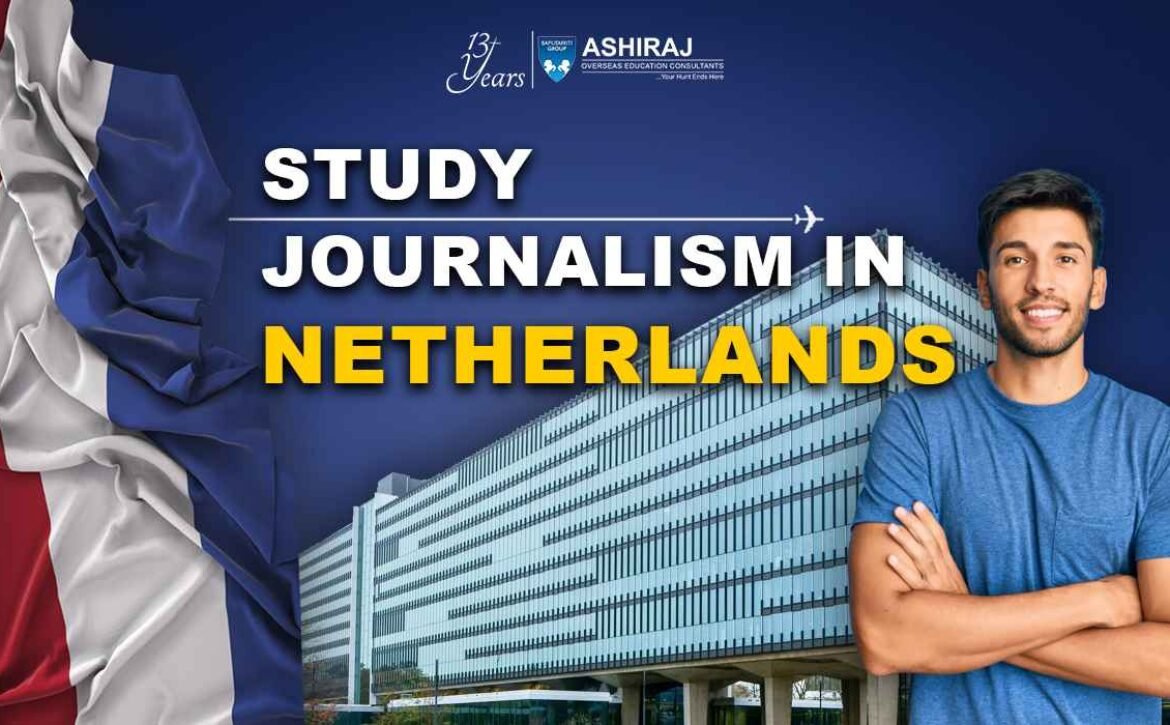
Journalism in Netherland
In the vibrant landscape of Dutch media, Journalism in the Netherlands stands as a dynamic force, embodying principles of objectivity, thorough investigation, and societal accountability. With a rich tradition dating back centuries, Dutch journalism has evolved into a multifaceted realm, reflecting the nation’s diverse culture and progressive values. From traditional print publications to innovative digital platforms, the Dutch media landscape offers a plethora of avenues for journalists to engage with audiences and shed light on pressing issues.
Journalism in the Netherlands navigates the complexities of a rapidly changing media landscape, where technological advancements, shifting audience behaviors, and evolving political landscapes shape the practice. Dutch journalists uphold rigorous standards of integrity and independence, striving to deliver accurate, insightful reporting that informs and empowers the public. In an era characterized by misinformation and polarization, Journalism in the Netherlands plays a crucial role in fostering informed citizenship and upholding democratic values, making it an indispensable pillar of Dutch society.
Why to Study Journalism in Netherlands
- Multicultural Exposure: The Netherlands boasts a diverse society, offering students a unique opportunity to engage with various perspectives and cultures, enriching their understanding of global issues.
- Innovative Education: Dutch universities are renowned for their innovative teaching methods and emphasis on practical experience. Journalism programs often integrate hands-on learning opportunities, preparing students for the ever-evolving media landscape.
- English-Friendly Environment: Many journalism programs in the Netherlands are conducted in English, making them accessible to international students. This facilitates a diverse learning environment and equips students with valuable language skills for a global career in journalism.
- Strong Media Industry: The Netherlands has a robust media industry with a rich tradition of quality journalism. Studying in this environment exposes students to industry professionals and networking opportunities, enhancing their career prospects upon graduation.
- Focus on Ethics and Integrity: Dutch journalism places a strong emphasis on ethics and integrity, instilling in students a sense of responsibility towards truthful and ethical reporting, essential in today’s media landscape.
- Opportunities for International Exposure: The Netherlands’ central location in Europe provides students with easy access to international media hubs, offering valuable opportunities for internships, exchanges, and networking with media professionals worldwide.
- Cutting-Edge Research: Dutch universities are at the forefront of journalism research, allowing students to engage with cutting-edge concepts and methodologies, shaping the future of the industry.
Studying Journalism in the Netherlands offers a comprehensive and enriching educational experience, equipping students with the skills, knowledge, and ethical foundation needed for a successful career in the dynamic field of media and communication.
Top Universities to Study Journalism in Netherlands
University | QS World University Ranking 2023 | Type of University | Average Annual Fees | Programs Offered |
University of Amsterdam | 15 | Public | €2,168 – €4,500 | – Bachelor in Communication Science |
– Master in Journalism | ||||
– Research Master in Communication Science | ||||
– Master in Media Studies | ||||
Utrecht University | 52 | Public | €2,168 – €4,500 | – Bachelor in Media and Culture |
– Master in Journalism and New Media | ||||
– Research Master in Media Studies | ||||
Erasmus University Rotterdam | 72 | Public | €2,168 – €4,500 | – Bachelor in Communication and Media |
– Master in Journalism | ||||
– Research Master in Media Studies | ||||
Leiden University | 92 | Public | €2,168 – €4,500 | – Bachelor in Journalism |
– Master in Media Studies | ||||
– Research Master in Communication and Media | ||||
Wageningen University & Research | 118 | Public | €2,168 – €4,500 | – Bachelor in Communication and Life Sciences |
– Master in Journalism and Media | ||||
– Research Master in Communication Studies |
Studying Journalism in the Netherlands offers a myriad of opportunities for aspiring journalists. Here are the top universities renowned for their journalism programs, according to the QS World University Rankings 2023. These institutions provide diverse programs, from bachelor’s to research master’s degrees, ensuring comprehensive education and practical experience in the field. With affordable average annual fees and a commitment to excellence, students can embark on a journey towards a successful career in Journalism in the Netherlands.
Course Curriculum for Journalism in Netherlands
- Multidisciplinary Approach: Journalism courses in the Netherlands typically adopt a multidisciplinary approach, integrating aspects of communication, media studies, and social sciences to provide students with a comprehensive understanding of the field.
- Core Modules: The curriculum often includes core modules covering journalistic principles, ethics, and practices, equipping students with the necessary skills for accurate and ethical reporting in various media formats.
- Digital Journalism: Given the evolving nature of media, there is a significant focus on digital journalism, including courses on multimedia storytelling, data journalism, and social media reporting, preparing students for the digital age.
- Practical Training: Many programs offer practical training through internships, workshops, and collaborative projects with media organizations, allowing students to apply theoretical knowledge in real-world settings.
- Specialization Options: Students often have the opportunity to specialize in areas such as investigative journalism, political reporting, or documentary filmmaking, enabling them to pursue their specific interests within the field.
- Research Opportunities: Some programs incorporate research components, encouraging students to engage in independent research projects or participate in research seminars, fostering critical thinking and analytical skills.
The journalism curriculum in the Netherlands reflects a commitment to providing students with a well-rounded education that combines theoretical knowledge with practical experience, preparing them for diverse career paths in Journalism in the Netherlands and beyond.
Eligibiity Criteria & Admission Requirements for MS in Journalism in Netherlands
- Language Proficiency: Applicants are typically required to demonstrate proficiency in English through standardized tests such as IELTS or TOEFL. For IELTS, a minimum score of 6.5 is commonly accepted, while for TOEFL, a score of at least 90 is often required.
- Academic Qualifications: Prospective students should hold a bachelor’s degree from a recognized institution. The field of study may vary, but degrees in journalism, communication, media studies, or related fields are preferred.
- Standardized Tests: Some universities may require applicants to submit scores from standardized tests such as GRE or GMAT. While requirements vary, a competitive score in the verbal and analytical writing sections is often sought.
- Documentation: Applicants need to provide essential documents such as a valid passport, academic transcripts, and certificates verifying their previous education.
- Work Experience: While not always mandatory, relevant work experience in journalism, media, or related fields can strengthen an applicant’s profile.
Criteria | Minimum Score/Requirement |
IELTS | Overall Band Score: 6.5 |
TOEFL | Total Score: 90 |
GRE | Verbal: 155, Quantitative: 155, Analytical Writing: 4.0 |
GMAT | Verbal: 28, Quantitative: 38, Integrated Reasoning: 4.0, Analytical Writing: 4.0 |
Journalism in the Netherlands welcomes applicants who meet these eligibility criteria, ensuring a diverse and qualified cohort of students ready to embark on their academic journey in the vibrant field of journalism
Documents Required for Studying Journalism in Netherlands
- Passport: A valid passport is essential for international applicants, serving as identification and proof of citizenship.
- Letters of Recommendation (LOR): Typically, two letters of recommendation from academic or professional references are required to assess the applicant’s character, abilities, and potential for success in the program.
- Statement of Purpose (SOP): The SOP provides insight into the applicant’s motivations, career goals, and reasons for choosing the journalism program in the Netherlands, allowing admissions committees to gauge their suitability for the course.
- Curriculum Vitae (CV): A comprehensive CV detailing the applicant’s educational background, work experience, extracurricular activities, and any relevant achievements or publications.
- Official High School Transcripts: Transcripts from secondary education institutions are necessary to verify the applicant’s academic performance and eligibility for higher education.
- Educational Certificates: Copies of educational certificates, such as diplomas or degrees, are required to confirm the completion of previous academic qualifications.
- Work Experience Certificate: If applicable, a work experience certificate or letter from previous employers may be requested to validate the applicant’s professional background.
- Proof of Financial Resources: Evidence of sufficient financial resources to cover tuition fees, living expenses, and other costs associated with studying journalism in the Netherlands is necessary for visa application and enrollment.
Ensuring the timely submission of these documents is crucial for a smooth application process and admission into a journalism program in the Netherlands.
Admission Process for Journalism in Netherlands
- Research Programs: Explore journalism programs offered by universities in the Netherlands, considering factors such as curriculum, faculty expertise, and campus facilities. Identify programs aligning with your academic and career goals.
- Check Eligibility: Review admission requirements, including academic qualifications, language proficiency tests (such as IELTS or TOEFL), standardized test scores (GRE or GMAT), and any specific prerequisites for the chosen program.
- Prepare Required Documents: Gather necessary documents, including transcripts, diplomas, CV, SOP, LOR, passport, proof of financial resources, and any additional documents specified by the university.
- Submit Application: Complete the online application form provided by the university, ensuring accuracy and completeness. Attach the required documents and pay any application fees as instructed.
- Language Proficiency Test: Take the required language proficiency test (IELTS or TOEFL) and submit scores to the university. If applicable, also take standardized tests like GRE or GMAT and submit scores.
- Await Admission Decision: After submitting the application, await the admission decision from the university. This process may take several weeks, so remain patient and monitor communication from the university closely.
- Acceptance and Enrollment: Upon receiving an offer of admission, carefully review the terms and conditions. If satisfied, accept the offer and follow the enrollment instructions provided by the university.
Navigating the admission process for Journalism in the Netherlands requires careful planning, attention to detail, and adherence to deadlines to ensure a successful application and enrollment.
“Education is the most powerful weapon which you can use to change the world.”
Nelson Mandela
Cost of Journalism Course in Netherlands
- Tuition Fees: The cost of tuition for journalism programs in the Netherlands varies depending on the university and the level of study. On average, international students can expect to pay between €2,000 to €4,500 per year for undergraduate and master’s programs.
- Living Expenses: Accommodation, food, transportation, and other living expenses contribute to the overall cost of studying journalism in the Netherlands. These expenses vary depending on the city and lifestyle choices but typically range from €800 to €1,200 per month.
- Additional Costs: Students should budget for additional expenses such as study materials, health insurance, visa fees, and leisure activities. These costs can vary widely but are essential to consider when planning for the overall cost of studying journalism.
- Scholarships and Financial Aid: Many universities in the Netherlands offer scholarships and financial aid opportunities for international students, helping to offset tuition and living expenses. Students should research and apply for these opportunities to lessen the financial burden.
- Part-Time Work: Some students opt to work part-time during their studies to supplement their income. While working part-time can help cover expenses, it’s essential to balance work and studies effectively.
Understanding the cost of studying journalism in the Netherlands is crucial for international students planning to pursue higher education in this field. By budgeting wisely and exploring financial aid options, students can manage their expenses and focus on their academic goals in Journalism in the Netherlands.
Scholarships for Journalism Courses in Netherlands
Scholarship Name | Amount | Application Deadline | Eligibility Criteria |
Holland Scholarship | €5,000 – €15,000 | 1st February | Non-EEA students applying for a bachelor’s or master’s degree at participating Dutch universities. Minimum GPA required. |
Orange Tulip Scholarship | Varies | Varies | International students from certain countries pursuing a master’s degree in specific fields, including journalism. Criteria vary by country and university. |
Erasmus Mundus Scholarships | Varies | Varies | Available for students from both EU and non-EU countries pursuing specific joint master’s programs in journalism and media. Application deadlines vary by program. |
Amsterdam Excellence Scholarship | Full tuition waiver + €25,000 stipend | 15th January | Exceptional non-EEA students applying for a master’s degree at the University of Amsterdam. Academic excellence and motivation required. |
Leiden University Excellence Scholarship | €10,000 – €15,000 | 1st February (for September intake) | Outstanding international students applying for a master’s degree at Leiden University. Based on academic merit and diversity contribution. |
Securing scholarships can significantly alleviate the financial burden of studying journalism in the Netherlands. Prospective students should carefully review eligibility criteria and deadlines, and submit applications well in advance to increase their chances of receiving financial assistance for Journalism in the Netherlands.
Career Opportunities After Journalism in Netherlands
Job Profile | Average Salary (per year) |
Journalist | €30,000 – €40,000 |
Editor | €35,000 – €45,000 |
Content Writer | €25,000 – €35,000 |
Media Producer | €35,000 – €45,000 |
Public Relations Specialist | €35,000 – €45,000 |
Journalism in the Netherlands opens doors to diverse career paths within the media industry. From traditional roles like journalists and editors to emerging positions such as content writers and media producers, there are ample opportunities for graduates to explore.
- Journalist: Research, investigate, and report news stories across various platforms, including print, broadcast, and online media.
- Editor: Review, revise, and oversee content for accuracy, style, and adherence to editorial policies.
- Content Writer: Create engaging and informative content for websites, blogs, social media, and other digital platforms.
- Media Producer: Coordinate and oversee the production of media content, including videos, podcasts, and documentaries.
- Public Relations Specialist: Develop and implement communication strategies to promote organizations, manage media relations, and enhance public perception.
These roles offer competitive salaries, with opportunities for growth and advancement within the dynamic media landscape of Journalism in the Netherlands.
Frequently Asked Questions About Journalism in Netherlands
Some of the top universities for journalism in the Netherlands include the University of Amsterdam, Utrecht University, and Erasmus University Rotterdam.
Yes, many journalism programs in the Netherlands are taught in English to accommodate international students.
Entry requirements typically include a bachelor’s degree, language proficiency tests (such as IELTS or TOEFL), and submission of relevant documents like transcripts and letters of recommendation.
Yes, there are scholarships available for international students, such as the Holland Scholarship and the Orange Tulip Scholarship, among others.
Graduates can pursue careers as journalists, editors, content writers, media producers, and public relations specialists, among others.
Yes, international students are allowed to work part-time while studying in the Netherlands, typically up to 20 hours per week during the academic year and full-time during scheduled breaks.
The average cost of tuition for journalism programs in the Netherlands ranges from €2,000 to €4,500 per year, with additional expenses for living costs.
The duration of journalism programs varies, but undergraduate degrees typically take three to four years to complete, while master’s programs usually last one to two years.
Yes, many journalism programs in the Netherlands offer internship opportunities, allowing students to gain practical experience in media organizations.
International students can access various support services, including academic advising, career counseling, language assistance, and student organizations dedicated to their needs.




